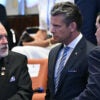The final part of a three-part series.
As Scribe noted in part two of our series on Ecotality, a company spokeswoman claimed in 2010 that federal support for the company was indicative of the success of the stimulus package. But was Ecotality really a good bet for taxpayers?
In addition to the stimulus funds it received in 2010 as part of the EV Project, Ecotality got a $26.4 million Energy Department grant in October of last year as part of DOE’s “Advanced Vehicle Testing and Evaluation project.” The award makes Ecotality the exclusive tester for the project.
That additional award came in the middle of a Securities and Exchange Commission investigation that started at least as far back as October 2010.
The investigation has targeted 18 individuals involved with the company, including its CEO Jonathan Read, his son Colin, the company’s vice president of corporate development, Colin’s wife and father-in-law, Ecotality’s senior VP of engineering, its former secretary and treasurer, a member of the board of directors, the director of stakeholder services at Ecotality North America, and numerous major Ecotality investors.
In short, the company is waist-deep in a federal investigation. And yet the DOE decided to double down on its investment in Ecotality despite the ongoing SEC probe.
Meanwhile, the company is in dire financial straits. Ecotality stock is down almost 84% since May of 2010, and it now sits below a dollar per share. According to Forbes, the company has a five-year average return on invested capital of negative 210.2%.
Ecotality’s latest earnings report shows it posted a quarterly loss of nearly $3.4 million. Its Energy Department grant payouts, totaling $6.8 million, accounted for 60% of its revenues in the first nine months of 2011, up from 38% during the same time period in 2010.
But while DOE funds appear to be keeping Ecotality afloat, the project for which those funds were appropriated is stalling. The company was supposed to install 15,000 charging stations as part of the EV Project, but so far is less than halfway towards emething that goal.
Rep. Andy Harris (R-MD), who has started asking questions about the Ecotality grants, called the shortfall “an apparent major deficiency in Ecotality’s execution of its DOE award.”
But despite the company’s tenuous financial footing – it seems wholly dependent on continued federal support – the ongoing decline in the value of its stock, and the disappointing pace of the EV Project, Ecotality more than doubled compensation for its executives last year.
According to its earnings report, “Executive and Director” compensation increased from $400,000 during the first three quarters of 2010 to $1 million during the same period last year – an increase that the report attributes to “the payment of the mid-year bonuses.”
In November, in fact, chief executive Jonathan Read was re-signed to an employment contract that pays more than $350,000 annually, with the possibility of an annual bonus worth 100% of his salary. He also received an additional 137,500 shares of company stock – admittedly, not worth what it once was, but still of significant value.
All of these factors raise serious doubts as to whether Ecotality was a good “bet” for the Energy Department. But as Scribe documented yesterday, the company has incorporated federal support into its business strategy. When political factors are paramount, the likelihood of financial loss grows.































One Reply to “Ecotality Examined: Big Executive Bonuses as DOE Keeps Company Afloat”